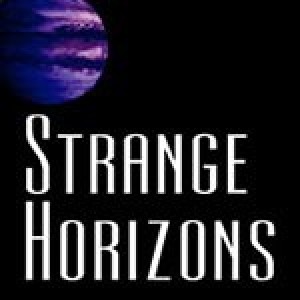Welcome back to Rich and Strange, a weekly reading of marvellous short fiction from around the web. Today’s review takes a look at “Nkásht íí” by Darcie Little Badger, published this week in Strange Horizons.
This week in Full Disclosure: nothing to declare! Except that this story is beautiful and hooked me from start to finish.
Josie and Annie are friends in ill fortune, homeless runaways who offer to listen to people’s problems on the street. One day a man tells them the story of how he lost his wife and infant daughter in a car accident—except he’s certain that his daughter survived, only to be stolen away by an owl-eyed woman who looked like his dead wife. Josie and Annie head out to Willowbee, the Central Texas town in which the accident took place, to see what they can learn about what happened, their own voices and histories weaving in and out of the plot before pulling it to a taut conclusion.
The voices in this story are clear and fluid and full of light: Josie telling the main story in first-person, Annie addressing Josie between the story’s lines. The lineaments of plot and character reminded me of some of Charles de Lint’s stories, except I found this narration richer and more ambitious in the way it unfolded its story, which was as much about Josie and Annie’s friendship and background as giving a grieving father closure. Josie’s life experience is of the material, of conflict with her step-father and the useless objects with which he surrounds her mother; Annie’s is one of vagueness and avoidance, more in-between, evanescent, with a family who’d rather see her placed in “facilities named after saints.” They complement and support each other. Additionally, Annie’s perception of the world is inflected by her great-grand-mother’s stories and her own unique sensitivities:
“We’ll need travel money,” she said. “C’mon.” I folded the sign, while Annie tucked the photograph in her messenger bag. A vertical crease between her eyebrows spoke to more worries than usual.
After thanking Maria de Soto for her shade, we crossed sunbaked streets. At Markov Deli, I paused and asked, “Here?”
Annie shook her head. No. We continued wandering.
Outside a gas station, the ritual repeated. “Here?” No.
One hour later, the Asian grocery store on Vega Street broke our unlucky streak. “Here?” Annie nodded. As we entered the store, a wind chime over the door tolled sweetly. It rang again when we exited with chicken dumplings, chrysanthemum tea, and the five hundred dollars Annie had won from a scratch-off lotto game called “Pushing Your Luck.”
I’m always slightly taken aback by how powerfully the representation of friendship between girls and women strikes me. I long, I thirst, I pine for it. This story gave it to me, and more: it gave me both women’s voices, access to both their interiority, to the depth and genuineness of their trust in and caring for each other. I also deeply enjoyed the glimpse into Lipan Apache ghost-lore (and not just because my interest in owls is, to put it mildly, A Thing), and the way it soaked through the story in organic and fascinating ways inseparable from the characters and their experience of the world and each other.
In short, I very much look forward to seeing more of Little Badger’s work, and highly recommend it.
Amal El-Mohtar is not obsessed with owls, not at all, not really, and is also totally not lying to you. She is the author of The Honey Month, a collection of stories and poems written to the taste of 28 different kinds of honey, and has now thrice received the Rhysling award for best short poem. Her short story “The Green Book” was nominated for a Nebula award. Her work has most recently appeared in Uncanny; in Lightspeed magazine’s special “Women Destroy Science Fiction” issue; and in Kaleidoscope: Diverse YA Science Fiction and Fantasy. She also edits Goblin Fruit, an online quarterly dedicated to fantastical poetry. Follow her on Twitter.










